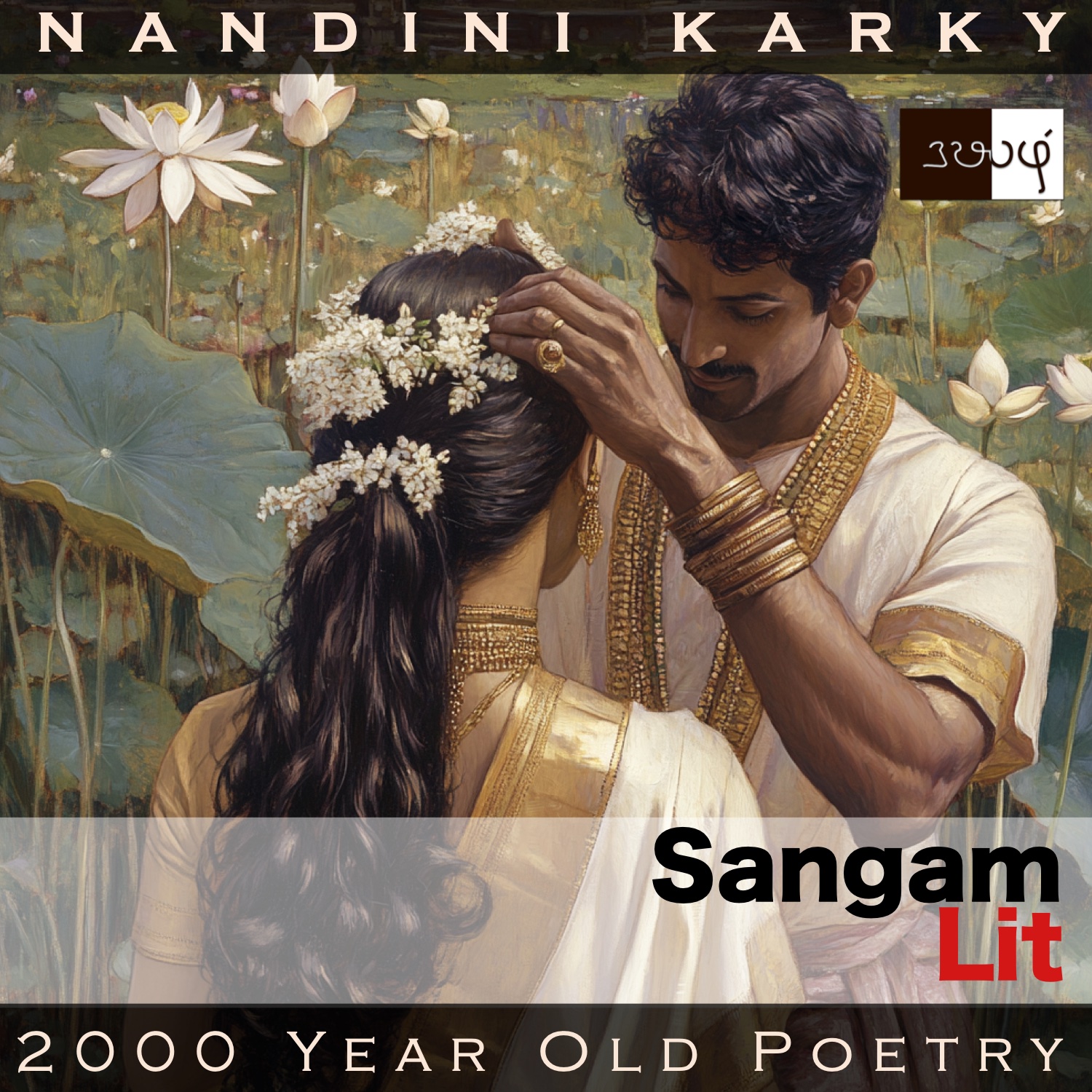Podcast: Play in new window | Download
Subscribe: Apple Podcasts | Spotify | Amazon Music | Android | iHeartRadio | TuneIn | RSS | More
In this episode, we observe a unique technique of persuasion, as portrayed in Sangam Literary work, Kalithogai 22, penned by the Chera King Paalai Paadiya Perunkadunko. The verse is situated in the ‘Paalai’ or ‘Drylands landscape’ and depicts the changing stance of the man.

உண் கடன் வழிமொழிந்து இரக்குங்கால் முகனும், தாம்
கொண்டது கொடுக்குங்கால் முகனும், வேறாகுதல்
பண்டும் இவ் உலகத்து இயற்கை; அஃது இன்றும்
புதுவது அன்றே புலனுடை மாந்திர்!
தாய் உயிர் பெய்த பாவை போல,
நலன் உடையார் மொழிக்கண் தாவார்; தாம் தம் நலம்
தாது தேர் பறவையின் அருந்து, இறல் கொடுக்குங்கால்,
ஏதிலார் கூறுவது எவனோ, நின் பொருள் வேட்கை?
நறு முல்லை நேர் முகை ஒப்ப நிரைத்த
செறி முறை பாராட்டினாய்; மற்று, எம் பல்லின்
பறி முறை பாராட்டினையோ? ஐய!
நெய் இடை நீவி மணி ஒளி விட்டன்ன
ஐவகை பாராட்டினாய்; மற்று, எம் கூந்தல்
செய்வினை பாராட்டினையோ? ஐய!
குளன் அணி தாமரைப் பாசரும்பு ஏய்க்கும்
இள முலை பாராட்டினாய்; மற்று, எம் மார்பில்
தளர் முலை பாராட்டினையோ? ஐய!
என ஆங்கு,
அடர் பொன் அவிர் ஏய்க்கும் அவ் வரி வாட,
சுடர் காய் சுரம் போகும் நும்மை யாம் எங்கண்
படர் கூற நின்றதும் உண்டோ? தொடர் கூர,
துவ்வாமை வந்தக்கடை?
An instance of a reminder about the past to resolve a crisis in the present! The words can be translated as follows:
“The face one has when seeking a loan with many words of praise and the face one has when returning that loan is different indeed. From times ancient, this is the nature of the world; This is not a new phenomenon today, O knowledgeable man! Akin to how a mother protects the daughter she brought to life, those who are righteous do not change their words; After relishing her beauty, akin to a bee that feeds on pollen, you wish to part away today. What can I, as a stranger, say about your desire for wealth?
O lord! You praised her close-set teeth, akin to a row of fragrant wild jasmine buds then; But when those teeth have fallen out and are replaced by new teeth now, do you praise them?
O lord! You praised her five-part braid, groomed with oil and glowing with the radiance of sapphires back then; But now, do you decorate and praise them?
O lord! You praised her young breasts, akin to fresh lotus buds that adorn a pond; But when they sag a little now, do you praise them?
And so, ruining the beautiful lines on her body, akin to thick sheets of gold spread out, you intend to leave to the drylands, scorched by the sun. What can I say about this suffering? This fate that has arrived to interrupt your togetherness?”
Time to delve into the nuances. The verse is set in the context of the man’s parting from his lady after marriage and the confidante renders these words to the man. In a different style, the confidante begins not by sketching the drylands but by conveying a philosophical thought about debt. She says the face of person, who gets a loan by saying humble words, praising the other, and the face of a person when they return that loan is totally different. She means to say that when people want something, they seem to act with much regard for the other and when the deed is done, that same care and respect is gone. She declares that this is an old truth of the world, telling us that the custom of loans has been there, for a long, long time. Returning, she reverts to another simile involving the manner in which a mother protects her daughter consistently all through life. Like that, righteous people always remain true to their words, she says. Then, she reminds the man about how he used to buzz around the lady like a bee, savouring her beauty, and now, he seems intent on parting with her to go in search of wealth.
In the customary three-step approach, the confidante continues by talking about the man’s behaviour during courtship; The way he used to celebrate the lady’s bud-like neat row of teeth, her well-oiled thick tresses and her lotus bud-like young breasts. She turns to him and says, while that was so, now he does not seem to be praising her permanent teeth or decorating her hair or celebrating her breasts that have sagged a little. A moment to process this accusation! I was startled when I understood that the man was praising the lady’s milk teeth, and now, the confidante is accusing him of not caring for the lady, when those teeth have fallen and permanent teeth have grown in place! We have already encountered a similar situation in Kurunthogai 337, when we understood that marriage happens early in the life of these girls. Setting aside our notions of the right age for marriage, let’s accept this as an uncomfortable historic truth. Moving on, the confidante concludes her statement by declaring her helplessness at the man’s thought to abandon the lady and make her beauty fade, so as to traverse the sweltering drylands in the pursuit of wealth.
The point the confidante seems to be making is simply this: When the man was in courtship, he was all praise for the lady, but now, after he has won her over, in a short while, he seemed to change shades and become someone else. This is the exact circumstance that the confidante opened this verse with, the changing face of a person, who is seeking a loan, and who is returning the loan. Through these references, the confidante intends to evoke the man’s sense of honour and make him protect his lady and remain true to his words always, like a mother’s unwavering love for her children, all through life!




Share your thoughts...